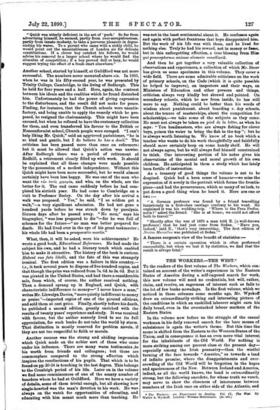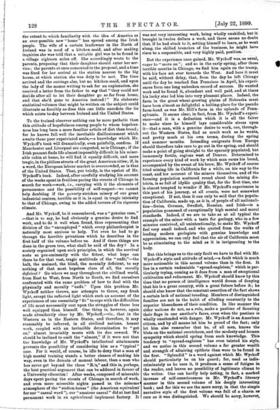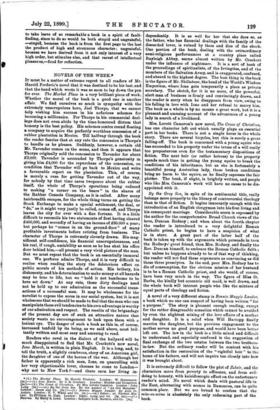THE WORKERS.—THE W EST.*
To the readers of the first volume of The Workers, which con- tained an account of the writer's experiences in the Eastern States of America during a self-imposed search for work, this new volume will need no credentials, but will, rather, claim, and receive, an eagerness of interest such as falls to the lot of few books nowadays. In the first volume, which we noticed in these columns some months ago, Mr. Wyckoff drew an extraordinarily striking and interesting picture of the conditions in which an unskilled labourer might earn his daily bread, even in the overstocked labour markets of the Eastern States.
In the volume now before us the struggle of the casual workman in his daily renewed search for the bare means of subsistence is again the writer's theme. But this time the scene is shifted from the Eastern to the Western States of the Union, and in consequence it has an even more vital interest for the inhabitants of the Old World. For nothing is more striking among our poorest class at the present day— especially among the Irish peasantry—than the wistful turning of the face towards "America," as towards a land of infinite promise, where the disappointments and over- crowding of the Old World will be forgotten in the hopes and spaciousness of the New. Between Ireland and America, indeed, as all the world knows, the bond is extraordinarily strong, but the following anecdote, for whose truth we vouch, may serve to show the closeness of intercourse between members of the Irish race on either side of the Atlantic, and e The Workers : an Experiment in Reality. Vol. If., The wee. By Walter A. Wyckoff. London : William Heinemann. [3s. net.]
the extent to which familiarity with the idea of America as an ever-possible new " home " has spread among the Irish people. The wife of a certain landowner in the North of Ireland was in need of a kitchen maid, and after making inquiries she was told that a suitable girl was to be found in a village eighteen miles off. She accordingly wrote to the parents, proposing that their daughter should enter her ser- vice; the parents at once consented to the proposal, and a time was fixed for her arrival at the station nearest to the big house, at which station she was duly to be met. The time arrived and the carriage also, but no kitchen-maid, and upon the lady of the manor.writing to ask for an explanation, she received a letter from the father to sai that "they could not decide after all to let their daughter go so far from home, and that she'd gone to America instead ! " No elaborate statistical volumes that might be written on the subject could illustrate as forcibly as does this one little anecdote the tie which exists to-day between Ireland and the United States.
To the trained observer nothing can be more pathetic than this attitude of hopefulness among people to whom hopeless- ness has long been a more familiar article of diet than bread ; for he knows full well the inevitable disillusionment which awaits these poor expatriated sou]s,—a knowledge which Mr. Wyckoff's book will dramatically, even painfully, confirm. If Manchester and Liverpool are congested, so is Chicago; if the Irish peasant finds life almost impossibly difficult in his miser- able cabin at home, he will find it equally difficult, and more tragic, in the pitiless streets of the great American cities; if, in a word, the European labour market is overcrowded, so is that of the United States. That, put briefly, is the upshot of Mr. Wyckoff's book. Indeed, after carefully studying his account of the weeks spent in fruitless pacing the streets of Chicago in search for work—work, i.e., carrying with it the elements of permanence and the possibility of self-respect—we cannot help doubting if the poverty-stricken misery of our great industrial centres, terrible as it is. is equal in tragic intensity to that of Chicago, owing to the added terrors of its rigorous climate.
And Mr. Wyckoff, be it remembered, was a "genuine case," —that is to say, he had obviously a genuine desire to find work, and to do it well when found, thus representing that division of the " unemployed " which every philanthropist is naturally most anxious to help. Yet even he had to go through the horrible privations which he describes in the first half of the volume before us. And if these things are done in the green tree, what shall be said of the dry ? In a society organised upon such principles, in which the survival rests so pre-eminently with the fittest, what hope can there be for that vast, tragic multitude of the "unfit,"—the halt, the maimed, the blind, the mentally deficient, to say nothing of that most hopeless class of all, the morally deficient? Go where we may throughout the civilised world, from East to West, from North to South, we find ourselves confronted with the same problem of how to deal with the physically and morally "unfit." Upon this problem Mr. Wyckoff neither throws, nor attempts to throw, any fresh light, except the reflected light which such an account of the experiences of one essentially "fit" to cope with the difficulties of life must necessarily cast upon the struggles of those less well equipped than himself. One thing is, however, again made abundantly clear by Mr. Wyckoff,—viz., that in the Western as in the Eastern States, and therefore, it may reasonably be inferred, in all civilised nations, honest work, coupled with an invincible determination to "get on," almost invariably meets with its due reward. We should be inclined to omit the "almost," if it were not that the knowledge of Mr. Wyckoff's intellectual attainments prevents the possibility of considering him as a " typical " case. For it would, of course, be idle to deny that a man of high mental training stands a better chance of making his way, even in the domain of manual labour, than a man who has never got beyond the three "R.'s," and this is, perhaps, the best practical argument that can be adduced in favour of a University education! After weeks, composed of miserable days spent pacing the streets of Chicago in search of work, and even more miserable nights passed in the noisomel atmosphere of the "station-house" (the American equivalent' for our "casual ward "), our "amateur casual" did at last find permanent work in an agricultural implement factory. It
was not very interesting work, being wholly unskilled, but it brought in twelve dollars a week, and there seems no doubt that, if he had stuck to it, setting himself to learn, as he went along, the skilled branches of the business, he might have risen to a responsible, and very highly paid, position.
But the experience once gained, Mr. Wyckoff was, as usual, eager to "move on"; and so in the early spring, after those terrible months in Chicago, we find him again on the tramp, with his face set ever towards the West. And here it must be said, without delay, that, from the day he left Chicago until the day he reached San Francisco in April, his experi- ences form one long unbroken record of success. He wanted work and he found it, abundant and well paid, and at times his lucky star led him into very pleasant places. Indeed, the farm in the great wheat-growing plains of Nebraska must have been almost as delightful a halting-place for the pseudo farm-hand as was Mr. Hill's farm in the uplands of Penn- sylvania. It seems clear, in fact, from Mr. Wyckoff's experi- ence—and it is a deduction which it is all the fairer to make since he himself lays considerable stress upon it--that a man, with a genuine desire to work, can, through- out the Western States, find as much work as he wants, and pretty much at his own terms, during the spring and summer months. Intending emigrants from Europe should therefore take care to go out in the spring, and should make a point of going straight to the sparsely populated, but immensely fertile, regions west of Denver. Determined to experience every kind of work by which man earns his bread, accompanied by the sweat of his brow, Mr. Wyckoff of course tried mining life in California for a while, on his way to the coast, and his account of the miners themselves, and of the farming population scattered round about the mining dis- tricts, is no full of idyllic quality that, for the first time, one is almost tempted to wonder if Mr. Wyckoff's experiences in this 'part of his journey, at all events, were not somewhat exceptional. If not, then it can only be said that the popula- tion of California, made up, as it is, of people of all nationali- ties—Swiss, German, Swedish, Russian, and Irish—is a population possessed of exceptionally high mental and moral standards. Indeed, if we are to take as at all typical the example of the miner with a taste for geology, who in a few minutes contrived, all unintentionally, to make Mr. Wyckoff feel very small indeed, and who quoted from the works of leading modern geologists with genuine knowledge and appreciation, we can only feel that the air of California must be as stimulating to the mind as it is invigorating to the body.
But this brings us to the only fault we have to find with Mr. Wyckoff's style and attitude of mind,—a fault which is much more noticeable in this second volume than in the first. It lies in a certain undeniable " spread-eagleism," which is par- ticularly trying, coming as it does from a man of exceptional cultivation and refinement. Mr. Wyckoff should know by this time that no person of intelligence would dream of denying that his is a great country, with a great fature before it ; he should also know that the constant assertion of the fact shows a certain lack of national breeding. Members of distinguished families are not in the habit of alluding constantly to the superior blessedness of their condition. In like manner the older nations do not, as a rule, make a pastime of flaunting their flags in one another's faces, even when the pastime is wholly unattended with danger. Mr. Wyckoff is an American citizen, and by all means let him be proud of the fact; only let him also remember that he, of all men, knows the blots on the national escutcheon, and the modesty and human sympathy which should spring from such knowledge. This tendency to " spread-eagleism " has even tainted his style, and we notice in this second volume a far greater wealth and strength of admiring epithets than were to be found in the first. " Splendid " is a word against which Mr. Wyckoff should particularly be on his guard; for, used as indis- criminately as he uses it, it produces a sense of fatigue in the reader, and leaves no possibility of legitimate climax to the writer. One can hardly help noting, in fact, a marked increase of self-consciousness in Mr. Wyckoff's literary manner in this second volume of his deeply interesting book ; and for this we are the more sorry, in that the simple narrative style of the first volume was full of a charm as rare as it was distinguished. We should be sorry, however, to take leave of so remarkable a book in a spirit of fault- finding, since to do so would be both stupid and ungrateful, —stupid, because the book is from the first page to the last the product of high and strenuous character; ungrateful, because we have derived from it not only interest of a very high order, but stimulus also, and that rarest of intellectual pleasures,—food for reflection.




































 Previous page
Previous page